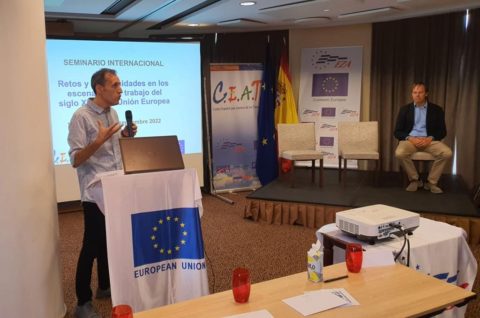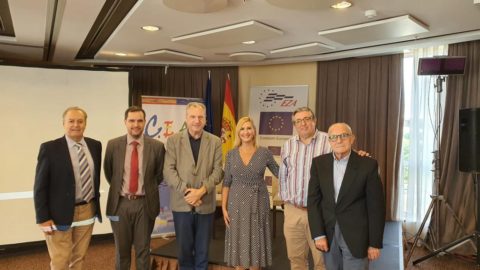
On the 23rd and 24th of September 2022, Valencia held the international seminar “The Challenges and Opportunities in the work scenarios of the 21st century”.
The organisation CEAT (Centro Español para los Asuntos de los Trabajadores) brought together different European organisations belonging to EZA (Europäisches Zentrum Für Arbeitnehmerfragen), which brings together more than 70 organisations from all over Europe, to debate and put forward proposals on the transformation of workplaces and the digital economy. A variety of actors representing political parties, trade unions, universities and different countries of the European Union participated.

The main topics of the debate focused on technology as an element of change, the incorporation of Artificial Intelligence to maintain and improve the welfare society and the risks that we also assume in terms of the lack of privacy and security in digital environments. The conversation also focused on the need to adapt Vocational Training to the real needs of the market and to link STEM directly to these studies due to the high number of jobs that exist and will arise in these subjects.
Some of the approaches that were discussed were put on the table by Salomé Pradas, in the opening session, highlighting the diversity of existing jobs and their adaptation to a new digital space. Not all of them can be 100% digitised. He stressed the need to attend to professions specific to the region, such as the tile industry, and to protect workers and employees in the sector, highlighting the importance of active participation in Europe and proposing alternatives to promote employment, especially among young people.

Piergorgio Sciaqua, Co-President of EZA, also stressed at the inauguration the importance of social dialogue between all European actors and the necessary collaboration between member countries to continue building Europe and the Europe of the future where technology is an added value to maintain and improve the quality of life and the welfare state.
The rural environment was also one of the topics on which the need to take measures to reactivate an exodus from the cities to the villages was established. This return to the rural environment has been favoured as a result of the COVID pandemic and has re-emerged as places of first and second residence. This has been made possible by teleworking, this rebalancing is something we need to take advantage of and follow lines that guarantee quality work and real connectivity everywhere. It was emphasised that this repopulation of the rural environment facilitates the possibility of maintaining and caring for the environment, preventing fires and allowing animals to develop in a suitable environment. To this end, the incorporation of technology, sensors and drones, among others, can facilitate measures to care for and control these spaces.
Miguel Barrachina stressed that just as large companies acquire CO2 emission rights and pay for it, farmers should be paid for the benefit they make in the care of the countryside and the maintenance and conservation of trees that limit pollution, for example in orange groves. One of the most applauded ideas was that farmers and stockbreeders should be allowed to do their work without so much bureaucracy and that they should be allowed to do their job as experts on the environment. The approach is to give value to hunting, pruning and forest care in a preventive way by means of a serious plan based on knowledge of the environment, using surveillance with drones, cameras and technology, and being able to anticipate the different problems that may arise. In Barrachina’s words, when land is abandoned and not looked after, a fire is being encouraged within 10 years.
José Seco, President of CSIF Education in the Valencian Community, provided headlines on the importance of lifelong learning. Education is an essential element of life, the feeling that teachers, parents and students have with the legislative changes is one of chaos. There is a lack of proper guidance for pupils so that they know how to achieve an end and that families know that there are always multiple paths to achieve it.
The Professor of Economics, Javier Morillas energised the table in which different organisations presented the vision of the future of work in their respective countries, Poland, Portugal and Italy and also the representative of the trade union USO showed the actions and work that they are currently carrying out. The participants were Pedro Estevao, Researcher at the University Institute of Lisbon (C.F.T.L.- BASE-F.U.T.) and Pedro Estevao, Researcher at the University Institute of Lisbon (C.F.T.L.- BASE-F.U.T.) – Portugal, Ms. Agata Dziubińska-Gawlik, President of Europejski Dom Spotkań – Fundacja Nowy Staw – Poland, José Manuel Pessanha, President Federação dos Trabalhadores Democrata-Cristãos (FTDC) – Portugal, Sheila Rosauro from USO Youth and Maria Reina Martin Vice-President of EZA. Undoubtedly, Artificial Intelligence (AI) is one of the crucial elements that are generating a great transformation in jobs, but it also has a direct application in maintaining and improving the current welfare state. José Luis Fernández, Director of the USO Research Office, explained the importance of the application of these technologies in day-to-day work, highlighting the risks of lack of privacy that teleworking can entail and the security breach inherent to it, as well as the importance of individual employee self-management in not being permanently connected and falling into the risk of not disconnecting.

Another of the elements debated throughout the seminar was the need to promote STEM studies and specifically in the field of Vocational Training, Vicente Marchante, President of USIE, Union of Education Inspectors in the Community of Valencia, explained the legislative changes that are being implemented at national level and in the Community of Valencia itself, and the need to link these Vocational Training studies with STEM due to the large number of emerging professions and those that will be created in the coming years for which there are no defined professional profiles as yet.
The debates and conversations of the seminar continued with a boat trip around the Albufera Valenciana, where the participants from the different Autonomous Communities and European countries who attended were able to learn first-hand about the environmental wealth of this protected environment and the processes linked to the cultivation, marketing and export of rice.
